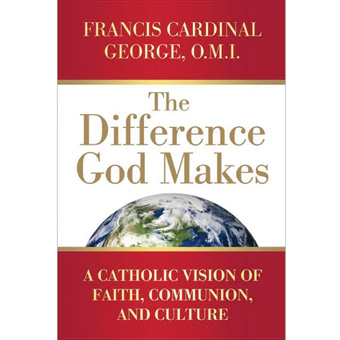The Difference God Makes By Cardinal Francis George, O.M.I. (Herder and Herder, 2009)
Chicago’s Cardinal Francis George has a knack for delivering off-the-cuff comments that generate controversy. Once asked why the church will not ordain women as priests, he responded, “Have you ever seen a male prima ballerina?” But those inclined to label George a “conservative” should spend some time with his new book, subtitled A Catholic Vision of Faith, Communion, and Culture. In a country where “conservative” is often used to describe those committed to limited government, unfettered markets, and muscular foreign policy, the application of the term to George may obscure as much as it reveals.
The book is a collection of essays and addresses that George has attempted to weld into a unified whole. The first section deals with church’s mission to the world with particular attention to the challenges posed by secularism and globalization. A second section focuses on the church’s inner life. In the final section George takes a more philosophical turn, arguing that human beings only exist as persons in and through others.
The essays can be seen as a running argument about evangelization in cultures shaped by the Enlightenment. George is critical of the ways in which the mainstream culture of the United States in particular understands freedom as the ability of individuals to be free of communal constraints. He argues that understanding the human person as fundamentally a sovereign individual reveals an understanding of human beings as fundamentally distant from God and each other.
George poses fundamental questions about American culture that Catholics should ponder. Nevertheless, he might also consider that individualism’s roots lie not only in philosophy and theology but in the lived experience of those who suffered at the hands of both church and state. While radical individualism makes life in communion impossible, so does abuse of authority.














Add comment